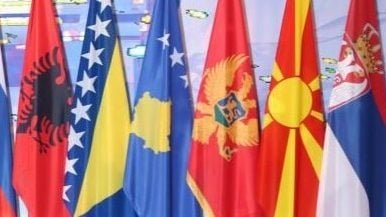The Western Balkans remain far more economically connected with the European Union than with any other major power, but China has in the past decade surged to second place, largely thanks to its strong partnership with Serbia, according to a new study by the Bertelsmann Foundation, the Vienna Institute for International Economic Studies (WIIW), and the European Centre for International Political Economy (ECIPE).
The Geoeconomic Interconnectivity Index (GEOII), based on 43 trade, financial, and political indicators covering 2010–2023, confirms the EU’s role as the leading economic force in its neighborhood, well ahead of China, Russia, and the United States. However, the report warns that the EU’s dominance is under pressure as geostrategic rivalries and global economic shifts intensify.
EU Still in the Lead, but Losing Ground
The study shows the EU remains the primary economic partner for the Western Balkans, Eastern Neighborhood, Turkey, and the Southern Mediterranean. Yet since 2021, the EU has gradually lost influence, particularly in Turkey and the Southern Mediterranean.
- China has strengthened its footprint in high-tech trade and infrastructure investments, making major inroads in the Western Balkans and Mediterranean.
- Russia continues to play a role through energy and agriculture, while the U.S. economic presence has declined further.
Regional Breakdown
- Albania is the most interconnected with the EU, followed by Bosnia and Herzegovina and North Macedonia.
- Serbia and Montenegro are moderately integrated, while Kosovo shows the weakest and most volatile economic interconnectivity with the EU, partly due to limited data quality.
- Serbia leads in ties with China, followed by Montenegro and North Macedonia. The other three Western Balkan states maintain much weaker Chinese links.
Strategic Outlook
The report stresses that economic connectivity is no longer automatic but a strategic tool for stability and influence. To maintain leadership, the EU must:
- Deepen trade and financial integration with neighbors.
- Modernize outdated trade agreements by reducing non-tariff barriers and opening markets, especially for agricultural products.
- Reform enlargement policy, considering gradual or partial integration of the Western Balkans, Ukraine, and Moldova.
- Invest in innovation, rare minerals, and digital infrastructure, while ensuring more effective use of credit and investment instruments.
Key Takeaway
The Western Balkans remain firmly tied to the EU, but China’s expanding role—particularly in Serbia—signals a shifting balance of influence. The EU’s next steps in trade, enlargement, and investment will determine whether it can hold its ground as the region’s primary economic partner.







